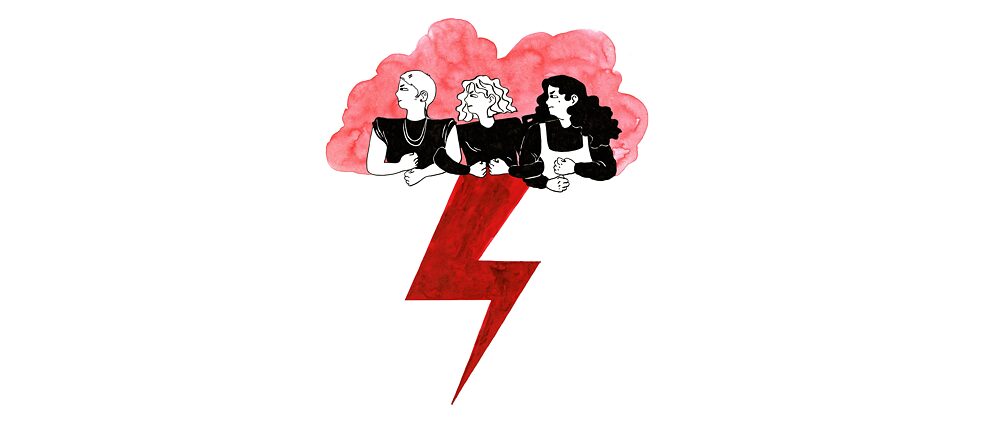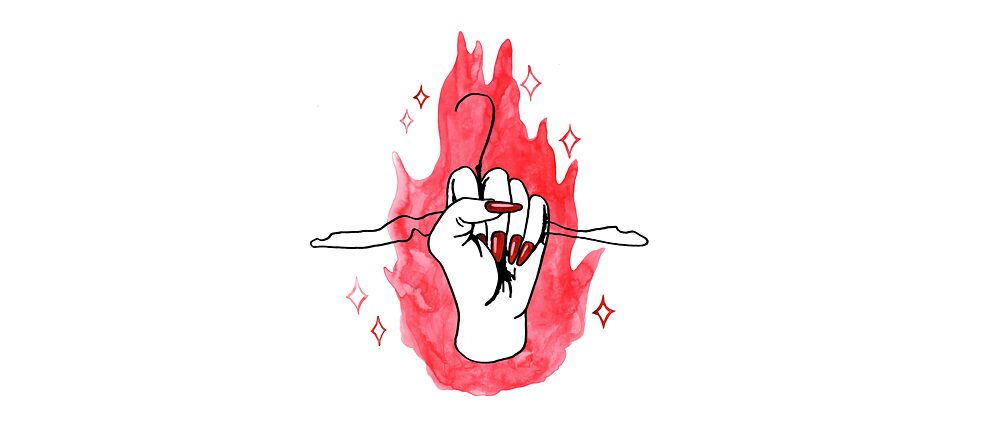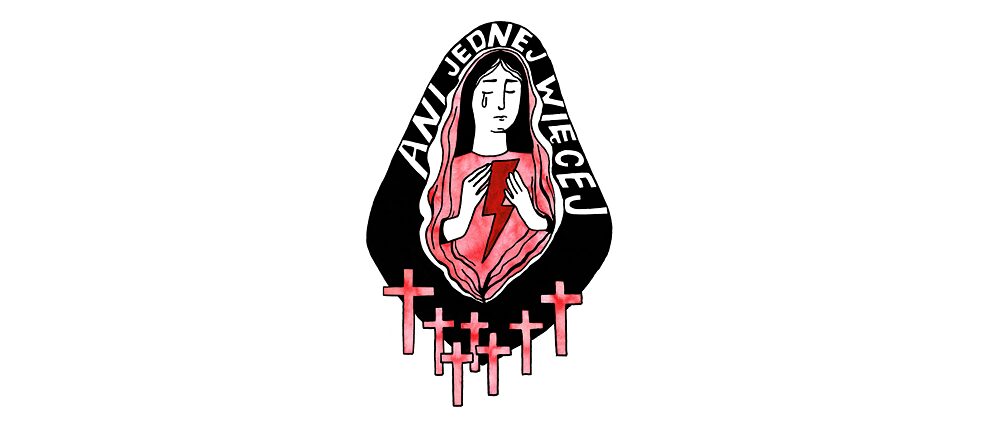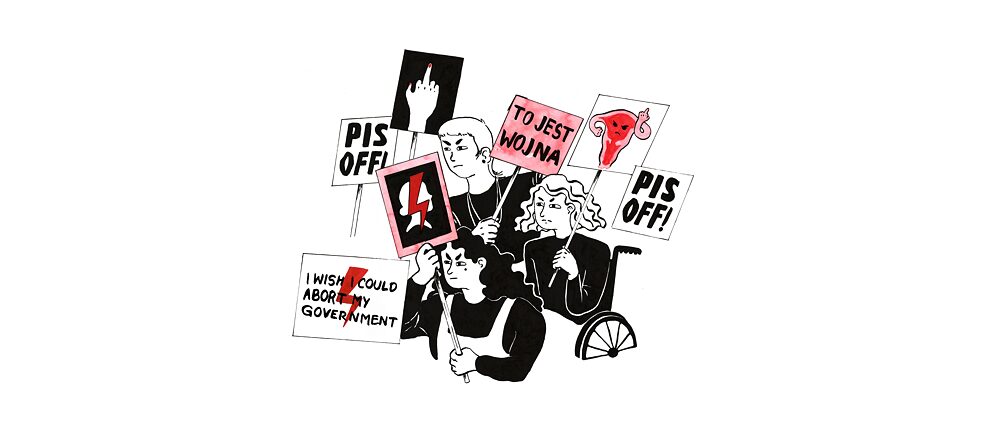Women’s Movement in Poland
“We Have Had Enough“

Since 2016, women in Poland have been taking to the streets for their rights. They continue to demonstrate, fighting one of the most restrictive abortion laws in Europe. Illustrator Magdalena Kaszuba tells their story in a comic.
By Magdalena Kaszuba, Marta Krus and Regine Hader
 Poland’s abortion laws
| Illustration: © Magdalena Kaszuba
Between 1956 and 1993, Poland’s abortion law was relatively liberal. But in 1993, the government tightened it with the so-called “abortion compromise”. The policy has become more and more conservative in recent years. Since 2020, there has been a near-total ban on abortion, even when the foetus has no chance of survival.
Poland’s abortion laws
| Illustration: © Magdalena Kaszuba
Between 1956 and 1993, Poland’s abortion law was relatively liberal. But in 1993, the government tightened it with the so-called “abortion compromise”. The policy has become more and more conservative in recent years. Since 2020, there has been a near-total ban on abortion, even when the foetus has no chance of survival.
 The red lightning bolt
| Illustration: © Magdalena Kaszuba
The right to abortion has always been one of the most fiercely contested rights. In 2016, feminists in Poland took to the streets, holding up clothes hangers between their pointer and middle fingers – a very old symbol of the desperate attempt to perform an abortion oneself, and of course of the danger of refusing medical services.
The red lightning bolt
| Illustration: © Magdalena Kaszuba
The right to abortion has always been one of the most fiercely contested rights. In 2016, feminists in Poland took to the streets, holding up clothes hangers between their pointer and middle fingers – a very old symbol of the desperate attempt to perform an abortion oneself, and of course of the danger of refusing medical services.
 Clothes hanger – a symbol for pregnancy terminations undertaken by women who do not have access to legal abortion.
| Illustration: © Magdalena Kaszuba
In autumn 2020, the women directly addressed the government and judiciary, chanting “Dość”, meaning “We have had enough,” to Julia Przyłębska, President of the Polish Constitutional Tribunal, and Jarosław Kaczyński, Chairman of the ruling Law and Justice (PiS) party, while demonstrating in front of their houses.
Clothes hanger – a symbol for pregnancy terminations undertaken by women who do not have access to legal abortion.
| Illustration: © Magdalena Kaszuba
In autumn 2020, the women directly addressed the government and judiciary, chanting “Dość”, meaning “We have had enough,” to Julia Przyłębska, President of the Polish Constitutional Tribunal, and Jarosław Kaczyński, Chairman of the ruling Law and Justice (PiS) party, while demonstrating in front of their houses.
 “Enough”
| Illustration: © Magdalena Kaszuba
“Not a Single One More”: By the time the 30-year-old Izabela, died of septic shock in 2021 because doctors did not perform an abortion even though there were irreversible foetal defects, the protest was already a mass phenomenon. Izabela is one of the first fatalities of the restrictive abortion policy to have been made public.
“Enough”
| Illustration: © Magdalena Kaszuba
“Not a Single One More”: By the time the 30-year-old Izabela, died of septic shock in 2021 because doctors did not perform an abortion even though there were irreversible foetal defects, the protest was already a mass phenomenon. Izabela is one of the first fatalities of the restrictive abortion policy to have been made public.
 “Not a Single One More“
| Illustration: © Magdalena Kaszuba
The demonstrators’ placards pull no punches: “P*** off“, “I wish I could abort my government“. Conservatives have criticised this language as being “unseemly” for women ...
“Not a Single One More“
| Illustration: © Magdalena Kaszuba
The demonstrators’ placards pull no punches: “P*** off“, “I wish I could abort my government“. Conservatives have criticised this language as being “unseemly” for women ...
 The laguage of the protests
| Illustration: © Magdalena Kaszuba
Among the mass of protesters, black umbrellas and red lightning bolts catch your eye. The black umbrella is a reminder of early twentieth-century Polish suffragettes who knocked on Marshal Józef Piłsudski’s door with their umbrellas, demanding equality and the vote for women. The red lightning bolt is a symbol of feminists’ opposition to the refusal of their basic rights. It means “Attention we warn” – and we warn now.
The laguage of the protests
| Illustration: © Magdalena Kaszuba
Among the mass of protesters, black umbrellas and red lightning bolts catch your eye. The black umbrella is a reminder of early twentieth-century Polish suffragettes who knocked on Marshal Józef Piłsudski’s door with their umbrellas, demanding equality and the vote for women. The red lightning bolt is a symbol of feminists’ opposition to the refusal of their basic rights. It means “Attention we warn” – and we warn now.
The long fight for self-determination and the abortion right
Between 1956 and 1993, legal abortion was possible in Poland if the pregnant woman was living in difficult social conditions or if the health of the foetus or the woman was at risk. Abortion was also allowed if the pregnancy resulted from a criminal act. The Act of 7 January 1993 on “Family Planning, Protection of the Human Embryo and Conditions for the Admissibility of Termination of Pregnancy”, the so-called “abortion compromise”, tightened the rules. From then on, a legal termination could only be performed in three cases: if the pregnancy posed a risk to the life or health of the woman, if there was evidence of severe and irreversible foetal deformities, or if the pregnancy resulted from a criminal act. The law was tightened further on 22 October 2020 in a Constitutional Tribunal ruling that abortions for congenital defects were not constitutional.
Thus, the law regulating access to termination of pregnancy in Poland is now one of the strictest in Europe.